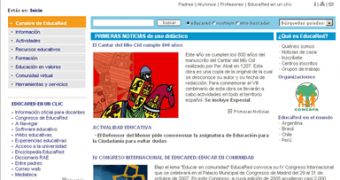Finnish mobile phone maker Nokia and the wireless operator Telefonica announced recently the signing of a partnership meant to provide educational content to remote schools in Latin America via mobile technology. According to the two companies, the agreement will transform the delivery of education in isolated areas and will promote social development while also closing the digital inclusion gap in the region.
Telefonica Foundation's "Pronino" and "Educared" social programs are expected to be expanded through the new partnership, while Nokia's work on using mobile technology for social development sees enhancements. The two initiatives from Telefonica are focused on improving the quality of education in the region via the use of information and communications technologies.
Telefonica COO Julio Linares said during the annual Telefonica Leadership Conference held this week in Miami, “This agreement fits our Spirit of Progress, which implies that we want to enhance people's lives as well as the progress of the communities where we operate, by delivering innovative services based on information and communications technologies. Wireless connectivity opens up strong opportunities of development and integration in Latin America.”
The implementation of the agreement will debut in Chile, where isolated schools will be able to access high-quality educational content, such as innovative resources, tools and services for students, fathers and teachers through Educared, while using Telefonica's mobile broadband and Nokia's mobile software called Nokia Education Delivery. Later, the agreement will be expanded to other countries in Latin America, with focus on the schools where Pronino works. In addition, Pronino and EducaRed are expected to improve the educational quality in areas where no fixed broadband connectivity exists.
Pronino is a program meant to eliminate child labor via quality education, and it managed to include more than 107,000 children from 13 countries in Latin America in 2008. The EducaRed program promotes the usage of ICT in education, offering different training programs for teachers, parents and children. EducaRed's Spanish and Latin American websites were visited more than 60 million times in 2008.
Nokia's CEO, Olli-Pekka Kallasvuo, stated at the Miami conference, “This partnership demonstrates the significant social benefits that mobile technology can deliver, reaching communities and children who previously had very limited educational opportunity in an inspiring and accessible way.”
Through the agreement, Telefonica Foundation's Pronino program is expected to adopt the Nokia Data Gathering software, which will offer the operator the possibility to use mobile devices for the monitoring and evaluation of the impact of the implementation. The move should enable faster decisions and reduce environmental impact, while also eliminating duplication of data entry. In addition, the two companies also announced plans to work together with local governments in Latin America for the use of information technologies to ensure economical competitiveness.

 14 DAY TRIAL //
14 DAY TRIAL //